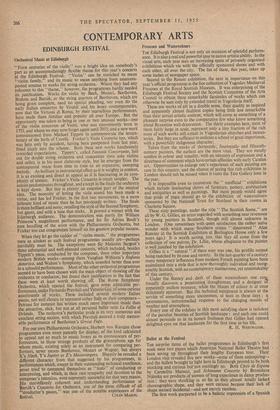CONTEMPORARY. ARTS
EDINBURGH FESTIVAL
Orchestral Music at Edinburgh
"Four centuries of the violin" was a bright idea on somebody's part as an accommodatingly flexible theme for this year's concerts at the Edinburgh Festival. "Violin" can be stretched to mean "violin family," and its music to mean anything from unaccom- panied sonatas to works for string orchestra. Where they had any reference to this "theme," however, the programmes hardly needed its justification. Works for violin by Bach, Mozart, Beethoven, Brahms and Bartok, or the string quartets of Beethoven, which are being given complete, need no special pleading, nor even do the early Italian concertos by Vivaldi and his lesser contemporaries, now that the Virtuosi di Roma, by their marvellous performances, have made them familiar and popular all over Europe. But the opportunity was taken to bring in one or two unusual works—one of the violin concertos of Viotti, who was conveniently born in 1753, and whom we may now forget again until 2053; and a new work commissioned from Michael Tippett to commemorate the tercen- tenary of the birth of Corelli. Fricker's Viola Concerto too, which was here only by accident, having been postponed from last year, fitted nicely into the scheme. Both these new works handsomely rewarded expectations. Tippett's, called Fantasia Concertante, laid out for double string orchestra and concertino (two solo violins and cello), is in his most elaborate style, but he emerges from the contrapuntal maze from time to time to an expansive, sweeping melody. As brilliant in instrumental effect as it is weighty in content, it is as exciting and direct in appeal as it is fascinating in its com- plexity of texture. Fricker's Viola Concerto is much simpler. The soloist predominates throughout, and except in the finale the orchestra is kept down. But this is plainly an essential part of the musical idea. The necessity of letting the viola sound has been made a virtue, and has led Fricker, in the first two movements, to a more intimate kind of music than he has previously written. The finale is more brilliant and noisy, recalling the style of the Second Symphony, but gayer, and with a tune that sticks. It proved a winner with the Edinburgh audience. The demonstration was partly for William Primrose's magnificent performance, and for Sir Adrian Boult's sure handling of the score with the Philharmonia Orchestra, but Fricker too can congratulate himself on his greatest popular success.
When they let go the rudder of "violin music," the programmes were as aimless as such festival programmes usually are—perhaps inevitably must be. The exceptions were Sir Malcolm Sargent's three substantial and well-planned concerts, which included, besides Tippett's piece, conducted by the composer, three other important modern British works—among them Vaughan Williams's Sinfonia Antartica, and Walton's Symphony, which sounded better than ever in a splendid performance. Most of the other orchestral programmes seemed to have been chosen with the main object of showing off the orchestra or conductor, but found their justification in the fact that these were at least worth showing off. The Rome SyMphony Orchestra, which opened the festival, gave some admirable per- formances, under Fernando Previtali and Vittorio Gui, of some curious assortments of works. These included several modern Italian pieces, not well chosen to represent either Italy or their composers- Petrassi for instance has written much more important music than the attractive, slick, but not at all personal ballet suite La Follia di Orlando. The orchestra's particular pride is its very numerous and excellent string section, with which Previtali secured a truly memor- able performance of Beethoven's Crosse Fuge.
For our own Philharmonia Orchestra, Herbert von Karajan chose programmes even more patently for display, of the kind calculated to appeal not so much to music lovers as to connoisseurs of per- formances, to. those • strange products of the gramophone age for whom music, existing solely as an instrument for comparing per- formers, never means Beethoven, Mozart or Wagner, but always X's Ninth, Y's Jupiter or Z's Mastersingers. Happily he revealed a different character from that suggested by his programmes, in performances which, except in their outstanding technical excellence, never tried to commend themselves as "feats" of conducting or interpreting, and which, in their rare sympathy and devotion to the composer's intention, were supremely successful for that very reason. His marvellously coherent and understanding performance of Dartok's Concerto for Orchestra, one of the most difficult of all "Conductor's pieces," was one of the notable experiences of, the
festival. COLIN MASON.


































 Previous page
Previous page